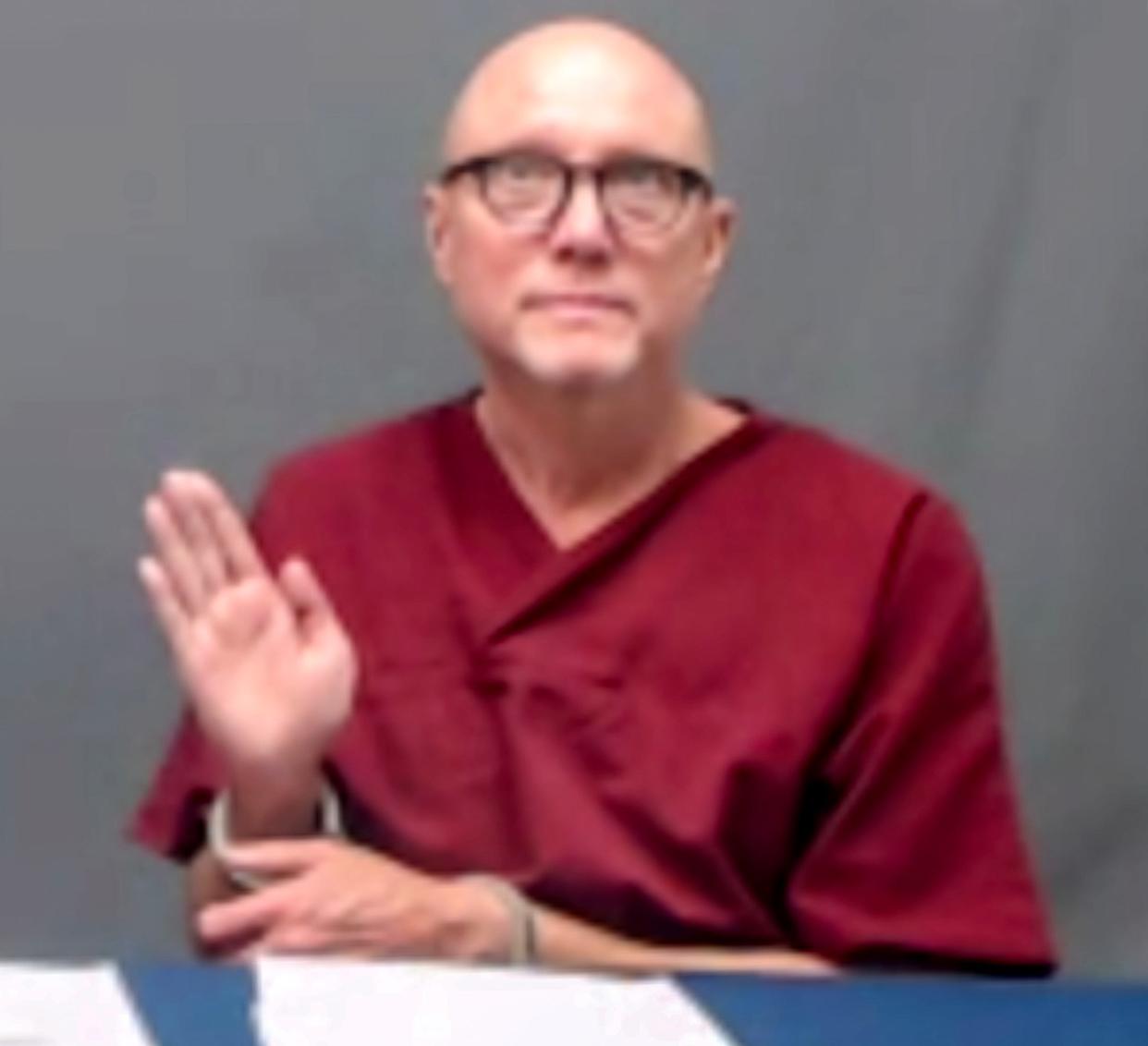Oklahoma death row inmate Phillip Hancock recommended for clemency

- Oops!Something went wrong.Please try again later.
A death row inmate who claims he killed in self-defense was recommended for clemency Wednesday.
Phillip Dean Hancock is set to be executed by lethal injection on Nov. 30 for the fatal shooting of two men in Oklahoma City in 2001.
The Oklahoma Pardon and Parole Board voted 3-2 to make the recommendation.
"I was in a life-or-death situation," Hancock, 59, told the board via a video link from the Oklahoma State Penitentiary in McAlester.
"They forced me to fight for my life. I absolutely regret, with all of my heart, that those men died as a result of the nightmare situation that they themselves created," he said. "I did what I had to do to save my life."
Gov. Kevin Stitt now will decide whether to commute Hancock's punishment to life in prison without the possibility of parole.
More: Legislator: Oklahomans believe in self-defense, so why is Phillip Hancock about to be executed?
Rare for the Oklahoma Pardon and Parole Board to recommend clemency
The board has recommended clemency only three other times since executions resumed in Oklahoma two years ago. The governor granted clemency only once, to Julius Jones, who was hours away from being executed.
The last inmate to be executed, Anthony Sanchez, passed up his clemency hearing because he said it would be futile.
Board members made their votes Wednesday without explanation.
The vote came after they heard from attorneys, the victims’ relatives, a clinical psychologist, two state legislators and, at the end, Hancock.
The inmate admitted again Wednesday that he fatally shot Robert Lee Jett Jr. at the biker's home in Oklahoma City early April 27, 2001, after being told to get into a cage.
He also admitted he fatally shot James Vincent "J.V." Lynch.
He claimed Jett, 38, was bludgeoning him with a metal tool while Lynch, 57, held him down in an armed bar chokehold. He said he shot after getting control of Jett's pistol.
"Please understand the awful situation I found myself in," he said.
More: Another retired judge joins Oklahoma Pardon and Parole Board
An Oklahoma County jury rejected his self-defense claim in 2004, found him guilty of first-degree murder and chose death as punishment.
Afterward, the trial judge wrote in a report that Hancock attacked both victims without provocation and at no time expressed any remorse.
Jurors didn't find Hancock credible because his self-defense claim was not supported by the physical evidence and an eyewitness, Assistant Attorney General Joshua Lockett said during the hearing.
Hancock also gave shifting stories, the assistant AG said.
The board also was told Hancock shot Jett a final time in the backyard. "I'm going to die," Jett said, according to the eyewitness testimony at trial. "Yes, you are," Hancock responded.
Not in dispute in the case was that Jett had grabbed a metal bar and ordered Hancock to get into a cage after a disagreement about an open pack of cigarettes. The men had ingested methamphetamine earlier.
"Their standoff ended just as quickly as it had begun though," Attorney General Gentner Drummond and his assistants told the board in a written submission about the case. "Jett seemingly let the issue lie and walked away ... headed for the front door. ... Hancock jumped up and came straight at him."
Hancock's attorneys submitted to the board a 2021 admission by his ex-girlfriend that she had asked Jett "to take care of Phil for me."
"I impulsively asked Bob if I could pay him a few hundred dollars to get Phil off my back," Katherine Quick said. "I didn't mean to put Phil's life in danger but I did. I wanted Bob to scare Phil but I wasn't considering how volatile Bob could be."
They also gave the board a statement from his lead defense attorney that he had been struggling with an alcohol and drug addiction at the time of the trial.
"I am embarrassed by the job I did on this case," attorney John W. Coyle III wrote.
A clinical psychologist who evaluated Hancock last year said he reacted the way he did in 2001 because he had been beaten as a boy, sexually assaulted at age 14 and gang raped in prison at age 19.
Rep. Kevin McDugle, R-Broken Arrow, asked the board to recommend clemency.
"We've got it wrong so many times in Oklahoma. Let's stand up and let's get it right at least once," he said.
Rep. J.J. Humphrey, R-Lane, also called for clemency, saying the shooting was obviously self-defense.
Hancock had been involved in a fatal shooting before, in 1982 at Oklahoma City's Stars and Stripes Park. He claimed self-defense at a murder trial and was convicted of first-degree manslaughter.
This article originally appeared on Oklahoman: Parole board recommends clemency for death row inmate Phillip Hancock

